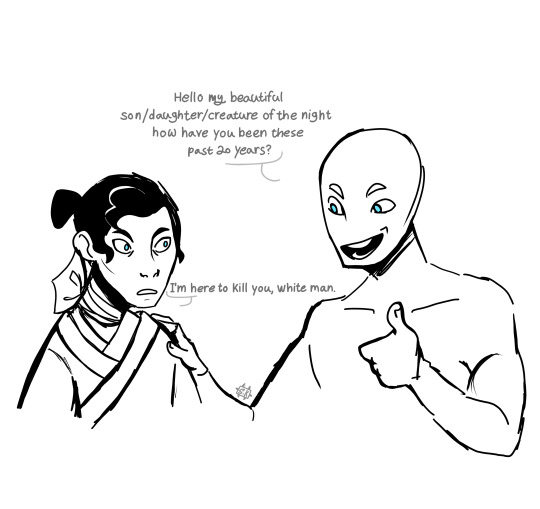Text
All jokes aside, rule #34 is SO griddlehark from Harrow's perspective. It's sooo harrow coded fr. Please tell me I'm not the only one who sees the vision
0 notes
Text
Idk if I'm not just a psyco but I have a USB-C phone and instead of using like, an apple charger or whatever I use my Nintendo switch charger. If you buy one separate it's 5 dollars less than an apple one AND it lasts for SO MUCH longer. I've had this charger for like, 3-5 years and it's fine. No major wear on the like, bits that always break on chargers. Also, it's 1 part so you can't lose the brick or cord.
0 notes
Text
So I've been watching the Witcher Netflix show and now I understand just why everyone would see Gideon and Alecto's eyes as so damn creepy. Like I'm 3 seasons in and I still think they're creepy during certain scenes.
3 notes
·
View notes
Text
crucial elements of my vision for a locked tomb animated series:
First season starts with Gideon falling to her death—freeze frame, Gideon voiceover: ���Yep, that’s me. You’re probably wondering how I got into this fucking mess.”
We rewind all the way to Gideon choking Harrow out as children. Gideon says “Well, now that’s just too far.” The running joke of the season is that this memory REALLY wants to play out, but Gideon refuses to get into it. That way, we get a lot of tension building up to the full scene and, more importantly, the imagery of the blood in Harrow’s nails really sticks with the audience.
Regular jumps between the present day and flashbacks so that they’re baked into the format and the river scenes in HtN don’t feel out of place.
Gideon pauses scenes literally all the time for asides and narration, a la The Emperor’s New Groove. (I feel her voice is crucial to the story and must be preserved as much as possible in a visual adaptation. The goofiness inherent to this device is also, in my opinion, completely necessary.)
When we finally get to the season finale, and Gideon dies, she KEEPS cutting in for asides, except now she’s talking directly to Harrow, who is responding, and it’s not really funny anymore.
3K notes
·
View notes
Text
I never even CONSIDERED that last one and it makes so much sense??
something i love about the soup scene is how many little details are COMPLETELY RECONTEXTUALIZED when you know what she's planning. things you wouldn't even question.
harrow is pacing and jumpy in the kitchen: she's understandably on edge from repeated attacks and lack of sleep -> she's worried someone will walk in on her and realize what she's up to
harrow panics and adds "a great deal of water" to the soup at the last minute: harrow has no fucking idea how to make soup -> she's worried the bone marrow will be more detectable if the broth is too thick
john tries the broth, sets down his spoon, and takes a "discrete sip of water": the soup sucks because harrow has no idea how to make soup -> john knows there's bone marrow in there and he's just waiting to see what she's going to do
harrow flinches when augustine makes a comment about confessing before they find a finger in the soup: harrow is sensitive about her shitty soup -> harrow literally put her own bone marrow in the soup and that comment has her severely on edge
harrow uses all of g1deon's least favorite vegetables: she fucking hates that guy -> she needs him to drink as much straight broth as possible because she is going to kill him with the broth
it's just. such a good scene. it's such a completely different scene when you read it for the second time.
2K notes
·
View notes
Text
Doomsday by Lizzy McAlpine is so Erisona??? Oh my goddd???
"You sit and stare like a goddamn machine" like??? "It's only the death of me" it's so them...
6 notes
·
View notes
Text
What would you do if harrowhark passed you the blunt

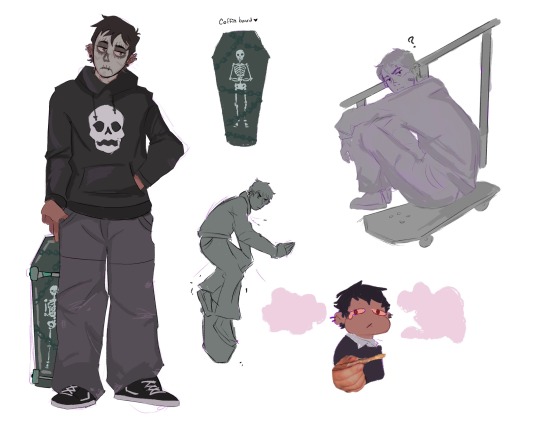
Skater AU Griddlehark ☠️🛹
2K notes
·
View notes
Text
why mizu is, in fact, not cis
Everyone is very angry at everyone about how to see or not see Mizu’s identity; being unable to shut up, and having fixated on the show a bit, i’m excited to finally join my first to-the-death-tumblr-discourse-battle.
I'm going to use mostly he/him for Mizu, but please read the premise.
The main argument for Mizu being a woman is that which has as its basis the fact that cross-dressing is for Mizu an external need: for one, it is a need for protection from patriarchal bonds; secondly, it is a need for independence - Akemi’s story is one of independence as well, of feminine independence, and we have more than one woman pursuing such thing; we could go on with an analysis of brothels as a feminine space, but, alas - and thirdly, it is a need of obligation: Mizu needs to maintain the masculine identity in order to attain the object of his vow.
I find, however, that while the argument stands as perfectly sound (and as canon) it isn’t exhaustive enough of the layered experience of gender in BES.
The trans coding is simply undeniable to me, whether it was intentional or not. I do not mean to say that Mizu is a binary trans man; that would be an approach as reductionist as confirming she is exclusively a woman. However, I find that some behaviours of Mizu’s are coded as dysphoric reactions.
Most of my justifications for this reasoning come from episodes 2, 5 and 8.
In episode 2, Ringo is vowing to never reveal Mizu’s secret: “I’ll never tell anybody you’re a g-“; and as soon as he’s about to say girl, Mizu is just as ready to slice his throat. Mizu being worried about someone else hearing or witnessing the interaction doesn’t seem completely plausible to me: they’re alone in snowy woods, and, most likely, Mizu wouldn’t have confirmed time and again how readily he���d kill Ringo.
Then comes episode 5, which is in my opinion the most layered and the most exhaustive in regards to Mizu’s experience of gender. First and foremost, it tells the ultimate teaching: that gender isn’t but a performance, just as the gender roles are portrayed through theatre in the episode. As for the dysphoric reaction, it's the whole thing. That's another reason why I suppose the puppet theatre tells Mizu's internal sense of self as well (see paragraph 4).
(And, about gender being performative, see how kabuki theatre was born in the Edo period and how, before being banned from acting, women cross-dressed to play male characters, and men cross-dressed to play female characters. See “professional transvestites” trained to be prostitutes, Kagema being trained from a young age to „act" like members of the other sex; see how by the beginning of the 18th century AFAB sex workers would try to figure out a way to set themselves apart from wakashu, creating an entirely new space for female crossdressers in the adult entertainment sphere; see ukiyo-e representations - chigo monogatari and yukiyo-zoshi literature; stories by Ihara Saikaku that are full of "transgender behaviours" and more)
Back to ep 5:
1. Theme of performance
The theme of performance, which also is the one of Mizu performing femininity for Mikio (in function of the well-being of Mizu’s mother), but being at once unable to suppress masculinity as the only space in which Mizu seems to be comfortable: e.g., it’s a little detail, but Mizu’s only good in the kitchen when cutting vegetables, because comfortable with blades, certainly not with cooking; again Mizu having to perform femininity is when he does makeup to “make-up”, to soften Mikio’s spirit, who feels invalidated by Mizu’s masculinity when it starts to interfere with his pride, and such other details; I even thought of the sword as a symbol for “learned” masculinity: the first time this thought occurred was when it was characterized by sensuality in the scene where the spouses spar: “Unsheathe it. Let me see your blade;” and I interpreted it as masculinity being the only space that allows intimacy as well; then comes the time where Mizu learns he does not need a sword to fight, meaning to me that she can embody masculinity without having to prove it to others. And then comes the reforging of the sword’s meteorite to include “impurities”, and the rite that Mizu performs. I assume that “a sword too pure” is the symbol of, again, learned hypermasculinity to appease patriarchal expectations, and is too pure because it’s Mizu rejecting part of himself, trying to exclude all “impurities”, whether they are being half white, or being half woman. Taigen himself is the one to tell Mizu he can fight without a sword (episode 7, and done in ep 6 already), and then the situation starts to bear sexual tension, which I directly link to the sensual connotation of the sparring cited earlier up. Possibly, this particular situation could also mean acceptance of Mizu's lack of a native "sword".
2. Gender roles
But a more sound consideration is (i would like to hope so) the one about the whole marriage being told through puppets, and the puppets themselves. While they are different characters, first of all we see an inversion of gender in the roles: at first Mizu is the Ronin because he performs a masculine role of protection, an “active” role; then, Mizu’s role is reversed in function of his marriage. We see Mizu surrendering (forcibly, being manipulated) to femininity as soon as his mother guilt-trips him into marrying, and the ronin puppet assumes a submissive pose, long before the role reversal.
3. A note:
it yet does not seem to me like the role reversal is, so to say, complete: even after the reversal, the narrator tells details about the ronin that are actually details about Mizu, e.g. when the two marry, and despite the positions of the puppets match the ones of the spouses, it is said that the ronin's loyalty is no more turned towards his "path of revenge," (Mizu's) "but to his bride (in the perspective explained below, perhaps Mizu's own femininity)."
4. Performance of Mizu's sides, assimilable to when she has the vision of killing his white side, shortly before facing the four fangs or whatever their name was
This, and one more tiny detail, bring me to think that not only do we talk about external roles, but about Mizu’s self-perception. I'm referring to when it is said that “for the first time in many years, the ronin felt the storm rage inside him.” The storm is a symbol belonging to Mizu (literally it occurs in the first 2 minutes of the episode), and it is explicit that it isn’t something that happens for the first time, but rather returns. By this point, the gender roles were reversed, and yet it seems to me like it isn’t anymore about the marriage itself, but rather about Mizu’s hatred for and slaughtering of his own femininity, and, of course, the experience of betrayal; with his family (especially his mother, see below), and with his femininity, which wasn’t enough to keep him comfortable or Mikio on his side. (...betrayal which is also about mizu himself betraying akemi, i'd add)
5. That random ass baby
There is, at a certain point, a situation of peace, which I think is represented when one of the puppets is holding a blue baby (supposedly a little ronin) in its arms. I want to suppose that the baby represents newborn love between Mizu and Mikio, before it all fell apart. But the love itself is a masculine love, as we see that it is based on masculine exchanges (fighting, doing fieldwork, taming horses, riding together, whatever) and, it seems to me, assimilable to homosexuality between samurai, which was widespread (insert something about Taigen here). Aside from that, on the level of Mizu’s self-perception, it might represent comfortableness, a sort of congruence, or, rather, a compromise, that Mizu is able to live in, between natural masculinity and performed femininity - opening up to show vulnerability, love fragile as a creature that cannot defend itself, innocent, naive, trusting.
6. About Mizu’s mother.
The puppet used for Mizu’s mother before the role reversal is the same that is supposedly used for Mizu after, but I latch onto a detail: the pattern on the puppet’s kimono is the same as the (real life) Mother’s kimono (see for example minute 12:30). I support this by noting the more obvious parallel between the blue worn by Mizu and the blue of the Ronin puppet, but at the same time I'm forced to note that after a certain point the mother has her own puppet. In any case, I see the mother and the feminine puppet wearing the same kimono as being about the mother’s betrayal of her child, rather than about Mizu herself. For one, manipulating him into marrying and abandoning the vow. But also we learn (ep 8) that the woman isn’t Mizu’s mother at all. One could discuss the reliability of Fowler’s statement, of course, for there is no guarantee. But I feel there are more clues regarding the mother’s betrayal: the episode starts with the Ronin, who feels the storm rage inside him at the killing of his lord (Mizu’s actual mother, perhaps) by the hands of a clan whose crest was the Phoenix (which I suppose are the white men, and the curse of whiteness for Mizu). I’ve thought about the four white men dealing guns (Fowler), flesh, opium (and I’m not sure what role “Violet” has in this, but I think they're the opium dealer), and thought that if Mizu’s “mother” was a substitute, the opium she smokes could point to Mizu’s potential father, at the surrogate mother being “nominated” by him and keeping contact, and at the surrogate’s betrayal at the same time. But it’s also true I watched the show while stoned.
7. Onryo (note: characteristic in kabuki)
When the birth of the vengeful spirit occurs, I see very well how plausible it is to say that, actually, the rage that Mizu feels is feminine rage, and I agree with that. Mizu’s femininity is his rage, it is heavily related to the mother-daughter relationship, despite the fact that at a certain point the mother has its own puppet. At the same time, however, it is to me the result of the slaughtering of the performed femininity needed to respect the obligation (we remember the wedding was also to ensure the “surrogate” mother safety, especially financial, as well as to keep Mizu bound), just as accepting you’re able to fight with any tool puts an end to the compensatory movement by which you’re trying to prove masculinity to an observer (which, say, Taigen does as well, wanting to prove to Mizu he can beat him - plus, Taigen himself is the one to reassure Mizu on the complete unimportance of it, see how I read the sword symbol a few paragraphs earlier).
In this perspective, the "dye washing away from her kimono" to me means two things: that being what he is is inevitable, and that the feminine rage sets in; Mizu tries to make up for being a "demon", but in the end rejects the obligation towards his husband, and towards her mother; the pattern is not the same anymore, and Mizu is somehow more like his own person, returning on the path of vengeance, strengthened by the feminine, as the reforged sword strengthened by the rite.
--
Episode 8, I feel, speaks instead for itself, for the dysphoric reaction is to me extremely clear. Reacting that way to being called a Miss is not a cisgender reaction. You’ll tell me: it’s not a dysphoric reaction! It’s a reaction of disgust to being fetishized for being a woman! And that’s plausible, supported by the “you just keep getting better,” with clear sexual implication, except I think that is also a fundamental trans experience.
In conclusion, I don’t think it might be all boiled down Mizu being a masc woman, because of the trans coding. Mizu thinks of himself as a guy. If not a guy, not a woman either. You’ll tell me: “Of course she does, because she’s grown up that way; she was forced to sustain the lie to preserve her life!” And while it is true that the initial context points towards crossdressing, and not inherent feelings of gender non conformity or transgenderism, I feel that if Mizu really felt like a woman, he wouldn’t have such exaggerated reactions, and I don’t think they come from his temperament either.
Even in situations where he couldn’t be discovered, he does not allow feminine terms or titles, or tries as best to stop them from happening; plus, it’s rather obvious how difficult the relationship with his body is.
While, once again, reading Mizu as a binary trans man is not enough, I feel like reading him as cisgender isn’t, either. As if, in any case, the feminine experience and the trans man one didn’t overlap in many aspects, also during the most tumultuous parts of transition, if pursued.
What is funniest above all is that the whole discourse is substantially useless. The layers of the show open to an infinite variety of interpretations, none of them fundamentally wrong. Mizu’s just quite literally Mizu. It’s a queer unlabeled thing and that’s it. The fundamental lesson about gender that you can derive from the show is that gender is a performative construct. What it pushes you to do is deconstruct your principles, especially if you are queer, since we are all entrapped in the modern western need for strict labelling; that’s where this whole debate comes from, and it is, once again, pointless.
So, instead making fun of other people because of a set of pronouns, perhaps it would be better to imagine that more options can cohabit together, or that there is no need to label at all.
As a final unrelated note, I haven’t seen anyone praise the masterful sound design
bye 🪳🪳🪳🪳🪳
60 notes
·
View notes
Text
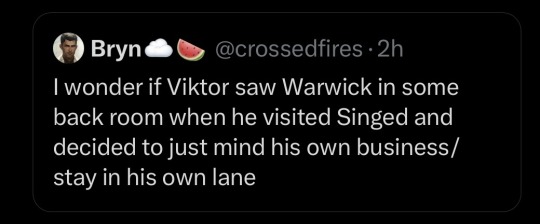
So Bryn made a good point over on Twitter, and uh. Yeah.
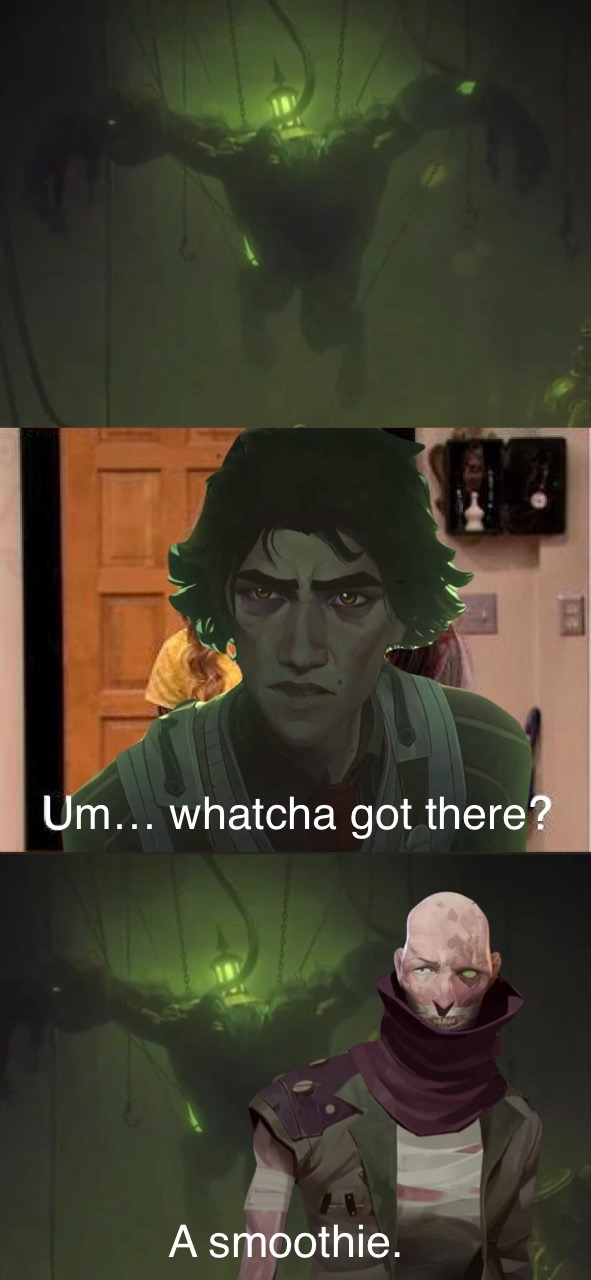
1K notes
·
View notes
Text
youtube
Dear Friend - An Arcane Story by AXL99
Jessie Lam, an accomplished concept artist and storyboarder who has worked on Invincible among other shows (remember the "that's the neat part, you don't" memes? They boarded that) has just released their ten minute Arcane fan-film, composed of immaculately crafted storyboards, exploring the feelings and relationships of Jinx, Vi and Caitlyn.
I would like everyone to watch it, please. I would like ALL OF YOU to watch it. Comment on it. Like it. I need you to do this favour for me.
557 notes
·
View notes
Text
i arrive at canaan house
hair: coiffed
muscles: ripped
rapier: out
lesbians: unimpressed
my soul is forcibly cannibalized by ianthe tridentarius
3K notes
·
View notes
Text
mizu arriving in london pre literally any form of sanitation:
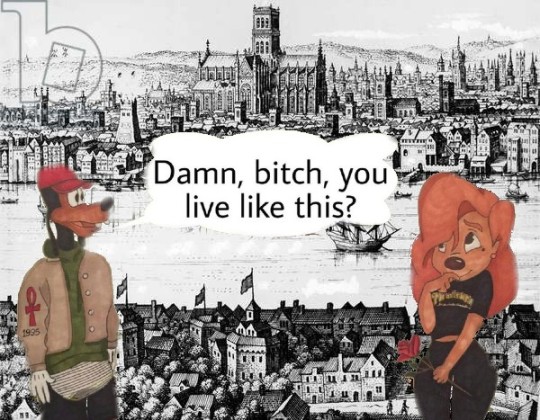
649 notes
·
View notes
Text
Mayhaps she owns a shark took necklace as well
camilla hect looks like she owns khaki shorts for special occasions
3K notes
·
View notes
Text
#fuckin ties a bell to Ringo's foot can't tell me swordfather didn't also do that to teenaged Mizu for the same reason
you can tell mizu was raised by an old man from the absolutely everything about them and I deeply love that
2K notes
·
View notes
